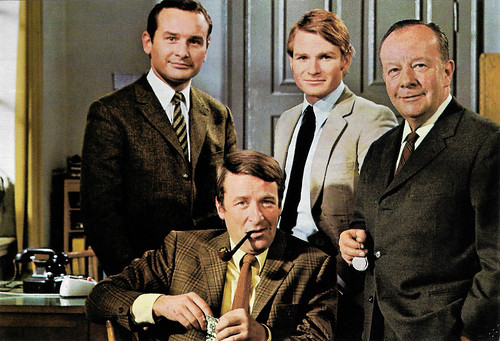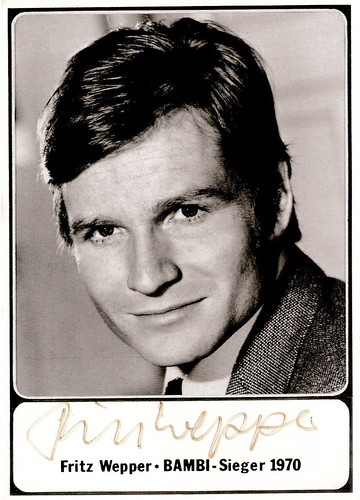
West German collector card in the Unsere Bambi-Lieblinge series by Penny Bildband, no. 14. Reinhard Glemnitz, Günther Schramm, Fritz Wepper and Erik Ode in Der Kommissar/The Commissioner (1969–1976). Caption: Erik Ode, "Der Kommissar", and his three assistants have been the uncrowned crime kings of German television since 1969.

German postcard by Franz Josef Rüdel Filmpostkartenverlag, Hamburg. Photo: Constantin. Publicity still for Wir hau'n die Pauker in die Pfanne/We'll Take Care of the Teachers (1970).
A seemingly unimportant bridge
Fritz Wepper was born in Munich, Germany in 1941. His father was the jurist Friedrich Karl Wepper, who has been missing since early 1945 in Poland. As a 9-year-old boy, Fritz played in children’s TV programs at the Bayerische Rundfunk (Bavarian TV). In 1952 he made his stage debut in 'Peter Pan'. He made his film debut with a small supporting part in Sauerbruch – Das war mein Leben/The Life of Surgeon Sauerbruch (Rolf Hansen, 1954), starring Ewald Balser.
More small roles followed in the drama Der dunkle Stern/The Dark Star (Hermann Kugelstadt, 1955), the Grimm Brothers’ fairytale Tischlein deck dich/Table, Donkey and Stick (Jürgen von Alten, 1956) and the comedy Eine verrückte Familie/A crazy family (Harald Philipp, 1957) starring Paul Dahlke and Hans Moser. Wepper also appeared in the Heinz Rühmann comedy Der Pauker/The Crammer (Axel von Ambesser, 1958).
He had his breakthrough in the anti-war film Die Brücke/The Bridge (Bernhard Wicki, 1959). Dan Pavlides at AllMovie: “This is an excellent little film with little plot and no known names on the roster. In the final days of World War II, German teenagers join the Nazi army in a futile attempt to stop the enemy invasion. A sympathetic officer places the boys as guards on a seemingly unimportant bridge. The seven youths are thrown into battle when American tanks unexpectedly appear and try to cross the bridge. The film has a definite anti-war message.”
From then on he also played on stage, such as at the Kleinen Komödie in Munich. In the cinema he was seen in such films as Question 7 (Stuart Rosenberg, 1961), the Walt Disney production Miracle of the White Stallions (Arthur Hiller, 1962), and on television in the Shakespeare adaptation Was Ihr wollt/As You Like It (Franz Peter Wirth, 1962) with Ingrid Andree, and Sonderurlaub/Special Leave (Rainer Erler, 1963).
In 1964, the then 23-year-old Fritz Wepper won the Filmband in Gold as Best Young Actor for his role in the war drama Kennwort: Reiher/The River Line (Rudolf Jugert, 1964) starring Peter van Eyck and Marie Versini.

West German postcard by Rüdel-Verlag, Hamburg, no. 5177. Photo: Divina / Gloria / Milles. Fritz Wepper in Nachbarn sind zum Ärgern da/Neighbors are there to annoy you (Peter Weck, 1970).

German postcard by Burda Fernsehen Starpostkarte. Publicity still for Der Kommissar/The Commissioner (1969–1976). Caption: 'Fritz Wepper - Bambi award winner 1970'.
Most successful German TV series ever
The crisis in the German film industry of the 1960s limited Fritz Wepper’s film career. He only found roles in mediocre genre films like the crime drama Wenn es Nacht wird auf der Reeperbahn/When Night Falls on the Reeperbahn (Rolf Olsen, 1967), Der Arzt von St. Pauli/ Bedroom Stewardesses (Rolf Hoppe, 1969) with Curd Jürgens, the Edgar Wallace thriller Der Mann mit dem Glasauge/The Man with the Glass Eye (Alfred Vohrer, 1969) starring Horst Tappert, and the comedy Wir Hau'n Die Pauker in Die Pfanne/We'll Take Care of the Teachers (Harald Reinl, 1970) with Uschi Glas.
He found new employment in the budding German TV industry. Wepper became internationally known with the popular Krimi series Der Kommissar/The Commissioner (1969–1976). In 66 episodes, Wepper portrayed Harry Klein, the assistant of Commissioner Keller (Erik Ode), from the series' start until 1974. In 1972 Fritz Wepper had another chance at an international film career with his role opposite Liza Minnelli and Michael York in the groundbreaking musical Cabaret (Bob Fosse, 1972), based on Christopher Isherwood's 'Goodbye to Berlin'. In this 10 Oscars nominated film, he played Fritz Wendel, a Jew passing as a Christian. Although the film lost the Best Picture Oscar to The Godfather (Francis Coppola, 1972), Cabaret won eight Oscars, including awards for Liza Minnelli and Bob Fosse. Hollywood agency MCA offered Wepper stage and film roles, but Der Kommissar producer Helmut Ringelmann did not allow Wepper to attend the Oscar gala, nor to accept the offered roles. It was a bitter disappointment for the actor.
In 1974, the character Harry Klein was replaced in Der Kommissar by his younger brother Erwin, played by Fritz Wepper's brother Elmar Wepper. Harry was transferred to the new Krimi series Derrick, starring Horst Tappert. In Derrick (1974-1998), Wepper would play Harry, now promoted to inspector, 281 times. The series was sold to over 100 countries and is reportedly the most successful German TV series ever. The series will no longer be repeated in both Germany and the Netherlands. The reason is the Nazi past of Horst Tappert, who starred in Derrick. Tappert died in 2008. Five years after his death, it was discovered that he had served in the Waffen-SS during the war.
In the cinema, Wepper appeared in the French Sci-Fi film Le Dernier Combat/The Last Battle (1983), the first feature-length film by the then 24-year-old Luc Besson. With his brother Elmar, Fritz Wepper worked together in the TV series Zwei Brüder/Two Brothers (1994-2001). He also had a role in the American made-for-TV remake of Agatha Christie’s mystery Murder on the Orient Express (Carl Schenkel, 2001), starring Alfred Molina as Hercule Poirot. From 2002 to 2021, Wepper played the lead in the TV series Um Himmels Willen/For Heaven's Sake, for which he was awarded the Deutscher Fernsehpreis (German TV Award). He starred in the series as mayor Wolfgang Wöller.
In 2004 Harry Klein returned in the comic animation film Derrick – Die Pflicht ruft/Derrick - Duty Calls! (Michael Schaack, Michael Ekbladh, 2004), and once again Wepper gave the character his voice. It was not a success. In 1979, Fritz Wepper married Angela von Morgen, Countess von Grotz and former Princess von Hohenzollern. They had one daughter, actress Sophie Wepper, with whom he appeared in the TV series Mord in bester Gesellschaft/High Society Murder (2007-2017). From 2009 on, Wepper lived with camerawoman and director Susanne Kellermann, who was 36 years his junior. In 2011 their daughter Filippa was born. He later returned to his wife. Angela von Morgen died in 2019 and in 2020, Wepper married Susanne Kellermann. He received a lifetime achievement award, the Bayerischen Fernsehpreis, in 2019. In 2024, Fritz Wepper died in Munich, Oberbayern, at 82.

West German card by ARD. Photo: Ralf U. Heinrich. Fritz Wepper in Um Himmels Willen/For Heaven's Sake (2002-2021).
Trailer for Der Mann mit dem Glasauge/The Man with the Glass Eye (1969). Source: RialtoFilm (YouTube).
Trailer Cabaret (1972). Source: GayMovieReviews (YouTube).
Sources: Stephanie D’heil (Steffi-Line - German), Dan Pavlides (AllMovie), NOS (Dutch), AllMovie, Wikipedia (English and German) and IMDb.
No comments:
Post a Comment